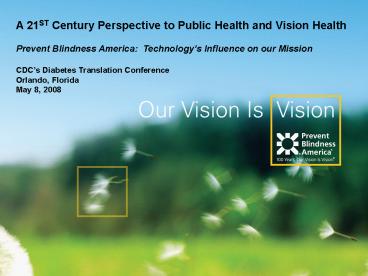Vision and Eye Health - PowerPoint PPT Presentation
1 / 33
Title:
Vision and Eye Health
Description:
Schools of Optometry/Departments of Ophthalmology. Not-for-Profit Organizations ... Ophthalmology. Vision Care Plans. Service Organizations. Professional Associations ... – PowerPoint PPT presentation
Number of Views:204
Avg rating:3.0/5.0
Title: Vision and Eye Health
1
A 21ST Century Perspective to Public Health and
Vision Health Prevent Blindness America
Technologys Influence on our Mission CDCs
Diabetes Translation ConferenceOrlando,
FloridaMay 8, 2008
2
Overview
- Prevent Blindness America 101
- Technologys Influence on
- Public Information
- Early Detection
- Resource Assistance
- Program Tracking
3
Prevent Blindness America 101
4
Our Mission
- To prevent blindness and preserve sight
- Our Vision is Vision
5
Key Milestones
- 1908
- Founded in NYC Committee on Prevention of
Blindness - Later became National Society for the Prevention
of Blindness - 1917
- Led legislative efforts to eliminate ophthalmia
neonatorum - 1926
- First volunteer pediatric screening program
- 1944
- First volunteer glaucoma screening program
- 1972
- Led legislative efforts to require impact
resistant lenses in eyewear
6
Key Milestones (contd)
- 1981
- First public education programs on diabetic eye
disease - 1989
- Launched the Center for Sight, a national,
toll-free information line - 1993
- Changed name to Prevent Blindness America
- 2002
- Cooperative agreement with Centers for Disease
Control and Prevention - 2008
- Centennial Celebration!
7
Our Structure
- National Organization (Chicago, IL)
- Affiliates/Divisions (18)
- 20 states and District of Columbia
- Program Partners (nationwide)
8
What We Do
- Screening Training
- Awareness Education
- Public
- Professional
- Public Health Efforts
- Research
9
Visionary Goals
- By 2020, Prevent Blindness America will
- Reduce vision loss by ensuring all children
receive appropriate vision care as they enter
school - Reduce vision loss by doubling the number of
adults receiving eye exams - Reduce injury-related vision loss by 50 by
promoting eye safety
10
Lets Talk Technology
11
Cant We All Get Along?
12
Technologys Influence On Public Information
13
Web Visits
14
Online Information Requests
15
Technologys Influence On Early Detection
16
Prevent Blindness Americas Training Efforts
- Screen approximately 2 million children annually
- Screen approximately 200,000 adults annually
- Referral rate averages 8.5
- Certification program for screeners
- Provide financial assistance resources and
guidance - Primary care education training
17
Screening Technology
- Frequency Doubling Technology
- Visual Acuity Machines
- Retinal Imaging Technologies
18
Retinal Screening
- Currently exploring inclusion in our efforts
- Pros
- Broadens scope of service
- Potential for identifying unknown diabetics
- New opportunities for partnerships
- Cons
- Diabetics should seek exams not screenings
- Costly for volunteer-based screenings
- Complexities involved in reading results
19
Technologys Influence On Resource Assistance
20
Avenues for Assistance
- Professional Associations
- Service Organizations
- Vision Care Plans
- Schools of Optometry/Departments of Ophthalmology
- Not-for-Profit Organizations
- Local Volunteers/Donated Exams
- Government Assistance Programs
21
Web-Based Assistance Portal
22
Technologys Influence On Program Tracking
23
PBA Data Collection System
- Data management system for PBA vision screening
and education programs - Secure
- Web-based
- Available to all PBA affiliates, divisions
partners - Tracks events, screenings follow-up exams
24
Volunteer/Screener Management
25
Partner Management
26
Grant Management
27
Event Management
28
Screening Information
29
Follow-up Information
30
Methods for Viewing Data
- Aggregate Data
- Number screened, referred
- Age-ranges
- Detailed Information
- Age, sex, ethnicity, diabetes, zip code and/or
county - Individual Records
- Contact information
- Individual demographics such as age, ethnicity,
diabetes, etc.
31
Screening ExamplePrevent Blindness Tri-State
32
Clinic ExamplePrevent Blindness Georgia
33
Thank You
- Jeff Todd, Senior Vice President
- 312-363-6026 jtodd_at_preventblindness.org
- Prevent Blindness America
- 211 West Wacker Drive, 1700
- Chicago, Illinois 60606
- 312-363-6001
- www.preventblindness.org































